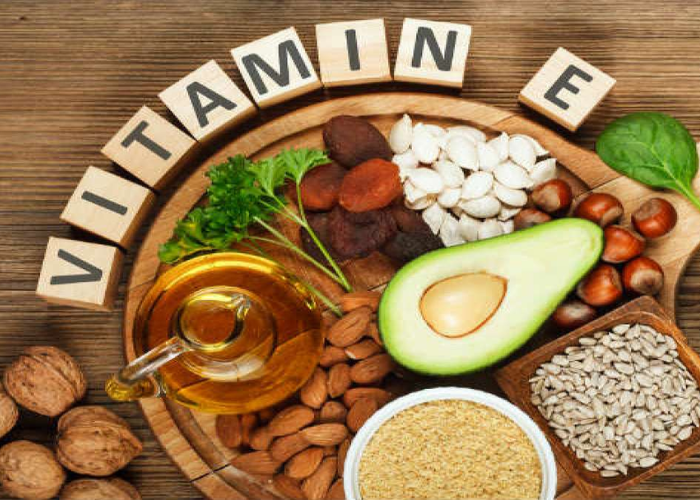Vitamin E is an essential nutrient that plays a critical role in human health. It is a fat-soluble vitamin found in many foods and dietary sources. Vitamin E is an antioxidant that helps protect cells from the damage caused by free radicals, and it is also essential for healthy skin, eyes, and immune system. It is also important for healthy blood vessels and for proper functioning of nerves and muscles.
Dietary Sources of Vitamin E
Dietary Sources of Vitamin E can be found in a variety of foods, such as nuts, seeds, vegetable oils, fortified cereals, and green leafy vegetables. Vitamin E is a fat-soluble vitamin that is found naturally in many foods, such as nuts, seeds, vegetable oils, and green leafy vegetables. Vitamin E is an antioxidant, which means it helps protect cells from damage caused by free radicals. Free radicals are molecules that can damage cells and lead to illnesses such as cancer and heart disease.
In addition to its antioxidant properties, Vitamin E can also help to reduce inflammation and improve skin health. Some of the best dietary sources of Vitamin E include almonds, sunflower seeds, hazelnuts, spinach, and avocado.
Additionally, some fortified cereals, breads, and juices also provide Vitamin E. While it is possible to get enough Vitamin E from dietary sources, supplements are also available to help ensure adequate intake of the vitamin.
Vitamin E Health Benefits
Vitamin E, an essential nutrient found in many foods, has a variety of health benefits. Vitamin E is a fat-soluble vitamin, meaning it is stored in the body’s fat tissues and liver. Vitamin E plays an important role in the body’s antioxidant defenses, protecting cells from damage caused by free radicals. Additionally, Vitamin E helps to protect the heart, eyes, and immune system. Studies suggest that Vitamin E may help reduce the risk of cancer, Alzheimer’s disease, and age-related cognitive decline.
Vitamin E has been found to help improve skin health, and can be used topically to reduce the signs of aging. Vitamin E has also been linked to improved fertility in men, helping to improve sperm motility and quality. Additionally, Vitamin E helps to reduce inflammation, which can help improve joint pain and stiffness, as well as reducing the risk of stroke.
Vitamin E is a powerful antioxidant, which helps to neutralize free radicals in the body. Free radicals are molecules that can damage cells, leading to oxidative stress and a number of other health conditions. By reducing these free radicals, Vitamin E can help to reduce the risk of health conditions such as cancer, heart disease, and other age-related diseases. Vitamin E is also essential for the proper functioning of the immune system, and can help to reduce inflammation.
Vitamin E can be found in many foods, including vegetable oils, nuts, seeds, and leafy green vegetables. Foods high in Vitamin E include almonds, sunflower seeds, hazelnuts, spinach, Swiss chard, and avocado. Additionally, Vitamin E can be taken as a dietary supplement. It is important to note that Vitamin E can interfere with certain medications, so it is important to speak to your doctor before taking a supplement.
Overall, Vitamin E is an essential nutrient with a variety of health benefits. From helping to protect the heart, eyes, and immune system, to reducing the risk of certain diseases, Vitamin E is an important nutrient that can help to improve overall health and well-being.
How to Get Adequate Vitamin E
Getting adequate Vitamin E is not difficult because it is found in many foods. To ensure you get enough Vitamin E, eat a variety of nuts, seeds, and oils, such as sunflower, safflower, and olive oils. Whole grains and fortified cereals are also excellent sources of Vitamin E.
Additionally, dark leafy greens, such as spinach and kale, contain Vitamin E. If you’re a vegan or vegetarian, you may wish to supplement with Vitamin E to ensure you’re getting enough. If you do decide to supplement, be sure to check with your doctor first to ensure it is safe for you to do so.
Potential Health Risks of Vitamin E
Vitamin E is an essential nutrient that has many health benefits, but it is important to understand the potential risks associated with taking too much of it. While it can provide many positive health benefits, too much of it can lead to adverse effects such as increased risk of bleeding, elevated blood sugar levels, and decreased absorption of other vitamins and minerals. It is important to be aware of these potential risks before taking a Vitamin E supplement, or consuming too much of the nutrient in food sources.
Additionally, anyone taking blood thinners or other medications should talk to their doctor before starting a Vitamin E supplement, as the supplement may interact with certain medications.
Lastly, pregnant women should consult their doctor before taking any Vitamin E supplement, as too much of it can lead to birth defects. The best way to get your Vitamin E is through a balanced diet with plenty of foods that are rich in the nutrient, such as nuts, seeds, vegetable oils, wheat germ, and fortified cereals.
Recommended Intake of Vitamin E
The recommended intake of Vitamin E is based on the individual’s age, sex, and other factors. The Dietary Reference Intake (DRI) for Vitamin E is 15 mg/day for adults. For children and adolescents, the recommended amount is 7 to 15 mg/day. It is important to note that the recommended intake of Vitamin E varies depending on the individual’s overall dietary intake of other fat-soluble vitamins.
Vitamin E is a fat-soluble vitamin that plays an important role in the body. It is an antioxidant that helps protect cells from the damage caused by free radicals, which are unstable molecules that can damage the cell’s structures and functions. Vitamin E also helps to strengthen the immune system and to keep blood vessels flexible and healthy. It also aids in the absorption of fat-soluble vitamins, such as Vitamin A, Vitamin K and Vitamin D.
The best sources of Vitamin E are plant-based foods, such as nuts, seeds, vegetable oils and leafy green vegetables. Fortified breakfast cereals, wheat germ and fortified foods such as enriched grains and breakfast cereals are also good sources. Vitamin E can also be found in animal sources, such as eggs, liver and fish, as well as in some fortified foods. In addition, it can be taken as a supplement in either softgel or liquid form.
Vitamin E is an important part of a healthy diet and can provide numerous health benefits. Eating a variety of foods that are rich in Vitamin E can help to ensure that individuals are getting the recommended intake of this important nutrient. Additionally, individuals who are unable to meet the recommended intake of Vitamin E through food sources should consider taking a supplement.
Potential Risks
When it comes to Vitamin E health benefits, there are numerous potential risks that should be taken into consideration. While Vitamin E is an essential nutrient for a healthy body, it is important to note that it can interact negatively with a variety of medications and supplements. Additionally, it can be toxic if taken in large doses.
Therefore, it is important to consult a physician before taking any Vitamin E supplements. Additionally, Vitamin E can increase the risk of bleeding, particularly in those who take blood-thinning medications. For this reason, it is important to be aware of potential side effects and take appropriate precautions.
Lastly, pregnant women should be cautious when taking Vitamin E supplements, as it has been linked to birth defects.
Recommended Dosages and Warnings
Vitamin E is a powerful antioxidant that is essential for human health and can be found in a variety of foods. Recommended dosages of vitamin E vary depending on age, gender and other factors, but a general guideline for adults is 15 milligrams per day. Higher doses may be recommended for certain individuals, such as pregnant women.
It is important to note that too much vitamin E can be toxic, and it is important to talk to a doctor before taking any supplements. Vitamin E can interact with certain medications, so it is important to talk to a physician before taking any supplements. Warnings should also be taken when taking vitamin E supplements, as it can increase the risk of bleeding and can interact with certain medications.
Additionally, people who are pregnant or breastfeeding should consult their doctor before taking any supplements. Vitamin E is an important nutrient and, when taken in the recommended dosage, can be beneficial for the body.
Conclusion
Vitamin E is one of the most important vitamins for overall health and well-being. It has many benefits, from helping to protect the body from free radical damage to boosting the immune system. There are also many nutritional sources of Vitamin E, from plant-based sources such as nuts, seeds, and whole grains to animal-based sources such as eggs and dairy products. To ensure you are getting the recommended daily amount of Vitamin E, it is important to include a variety of foods in your diet and to speak with a healthcare professional if you have any questions. By following these guidelines, you can help ensure that you are getting the most out of your Vitamin E intake.


